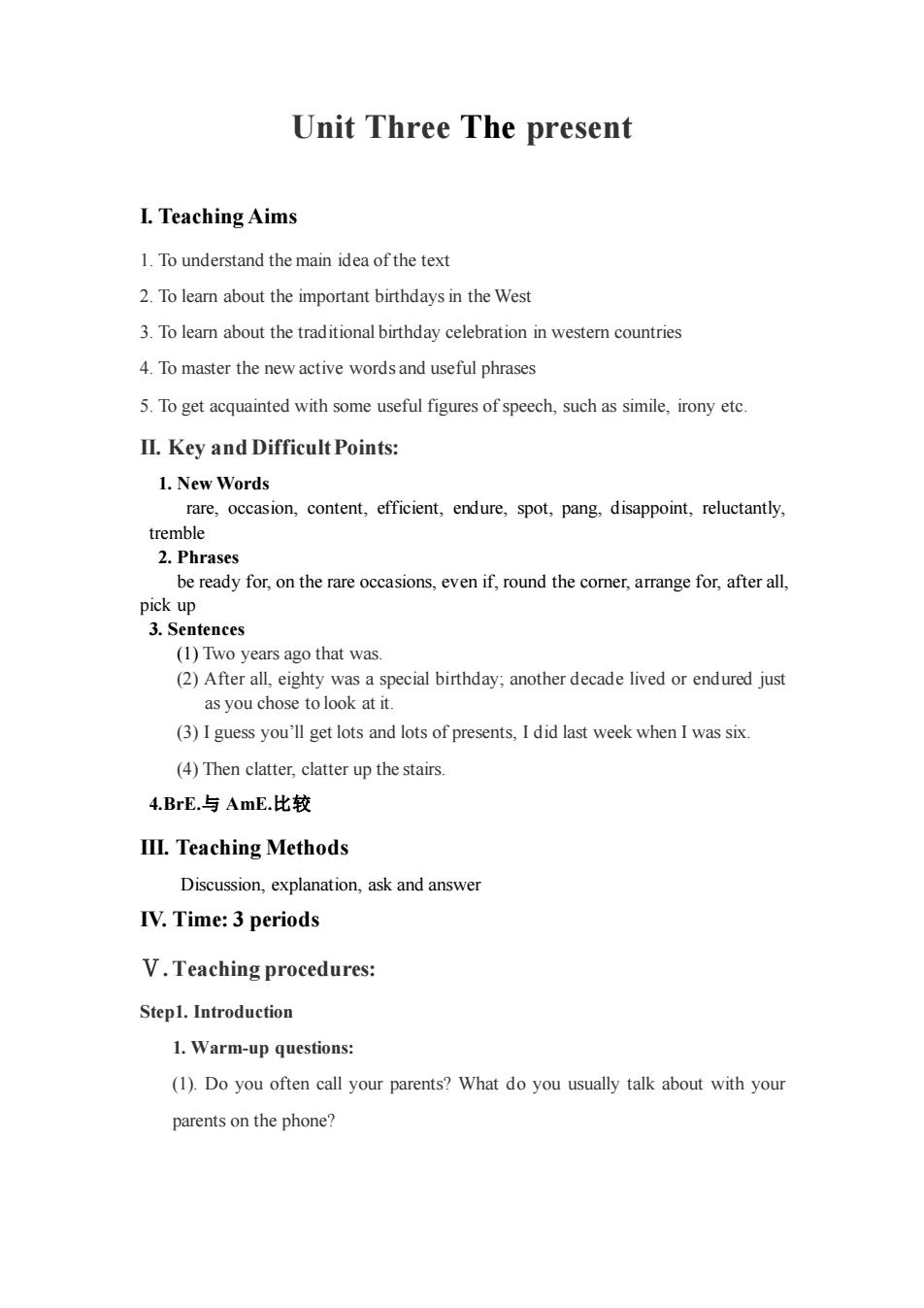
Unit Three The present I.Teaching Aims 1.To understand the main idea of the text 2.To leam about the important birthdays in the West 3.To leam about the traditional birthday celebration in westem countries 4.To master the new active words and useful phrases 5.To get acquainted with some useful figures of speech,such as simile,irony etc II.Key and Difficult Points: 1.New Words rare,occasion,content,efficient,endure,spot,pang,disappoint,reluctantly, tremble 2.Phrases be ready for,on the rare occasions,even if.round the comer,arrange for,after all. entences (1)Two years ago that was. (2)After all,eighty was a special birthday;another decade lived or endured just as you chose to look at it. (3)I guess you'll get lots and lots of presents,I did last week when I was six. (4)Then clatter,clatter up the stairs. 4.BrE.与AmE.比较 III.Teaching Methods Discussion,explanation,ask and answer IV.Time:3 periods V.Teaching procedures: Step1.Introduction 1.Warm-up questions: (1).Do you often call your parents?What do you usually talk about with your parents on the phone?
Unit Three The present I. Teaching Aims 1. To understand the main idea of the text 2. To learn about the important birthdays in the West 3. To learn about the traditional birthday celebration in western countries 4. To master the new active words and useful phrases 5. To get acquainted with some useful figures of speech, such as simile, irony etc. II. Key and Difficult Points: 1. New Words rare, occasion, content, efficient, endure, spot, pang, disappoint, reluctantly, tremble 2. Phrases be ready for, on the rare occasions, even if, round the corner, arrange for, after all, pick up 3. Sentences (1) Two years ago that was. (2) After all, eighty was a special birthday; another decade lived or endured just as you chose to look at it. (3) I guess you’ll get lots and lots of presents, I did last week when I was six. (4) Then clatter, clatter up the stairs. 4.BrE.与 AmE.比较 III. Teaching Methods Discussion, explanation, ask and answer IV. Time: 3 periods Ⅴ. Teaching procedures: Step1. Introduction 1. Warm-up questions: (1). Do you often call your parents? What do you usually talk about with your parents on the phone?
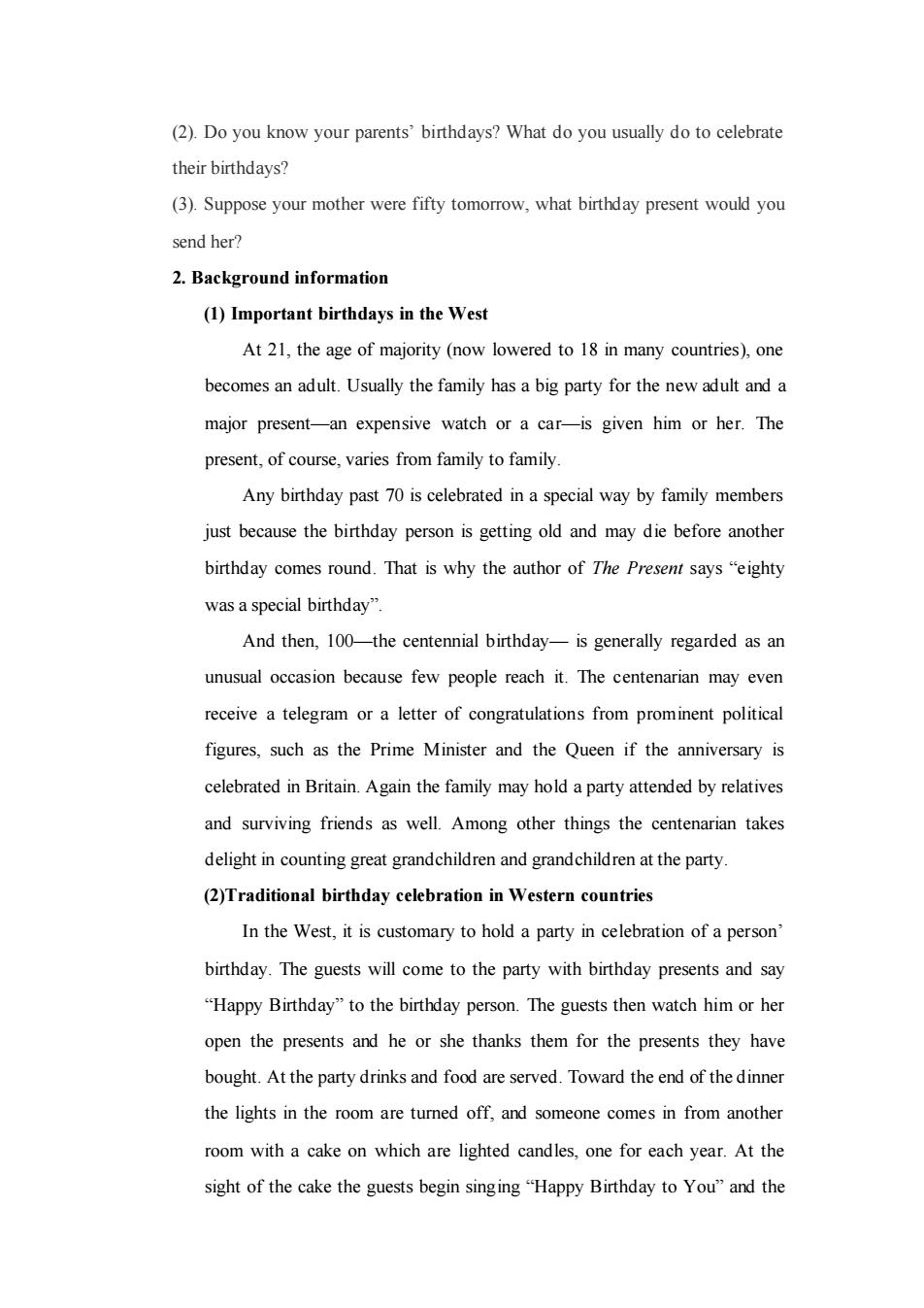
(2).Do you know your parents'birthdays?What do you usually do to celebrate their birthdays? (3).Suppose your mother were fifty tomorrow,what birthday present would you send her? 2.Background information (1)Important birthdays in the West At 21,the age of majority (now lowered to 18 in many countries),one becomes an adult.Usually the family has a big party for the new adult and a major present-an expensive watch or a car-is given him or her.The present,of course,varies from family to family Any birthday past 70 is celebrated in a special way by family members just because the birthday person is getting old and may die before another birthday comes round.That is why the author of The Present says"eighty was a special birthday” And then,100-the centennial birthday-is generally regarded as an unusual occasion because few people reach it.The centenarian may even receive a telegram or a letter of congratulations from prominent political figures,such as the Prime Minister and the Queen if the anniversary is celebrated in Britain.Again the family may hold a party attended by relatives and surviving friends as well.Among other things the centenarian takes delight in counting great grandchildren and grandchildren at the party (2)Traditional birthday celebration in Western countries In the West,it is customary to hold a party in celebration of a person' birthday.The guests will come to the party with birthday presents and say "Happy Birthday"to the birthday person.The guests then watch him or her open the presents and he or she thanks them for the presents they have bought.At the party drinks and food are served.Toward the end of the dinner the lights in the room are tumned off,and someone comes in from another room with a cake on which are lighted candles,one for each year.At the sight of the cake the guests begin singing"Happy Birthday to You"and the
(2). Do you know your parents’ birthdays? What do you usually do to celebrate their birthdays? (3). Suppose your mother were fifty tomorrow, what birthday present would you send her? 2. Background information (1) Important birthdays in the West At 21, the age of majority (now lowered to 18 in many countries), one becomes an adult. Usually the family has a big party for the new adult and a major present—an expensive watch or a car—is given him or her. The present, of course, varies from family to family. Any birthday past 70 is celebrated in a special way by family members just because the birthday person is getting old and may die before another birthday comes round. That is why the author of The Present says “eighty was a special birthday”. And then, 100—the centennial birthday— is generally regarded as an unusual occasion because few people reach it. The centenarian may even receive a telegram or a letter of congratulations from prominent political figures, such as the Prime Minister and the Queen if the anniversary is celebrated in Britain. Again the family may hold a party attended by relatives and surviving friends as well. Among other things the centenarian takes delight in counting great grandchildren and grandchildren at the party. (2)Traditional birthday celebration in Western countries In the West, it is customary to hold a party in celebration of a person’ birthday. The guests will come to the party with birthday presents and say “Happy Birthday” to the birthday person. The guests then watch him or her open the presents and he or she thanks them for the presents they have bought. At the party drinks and food are served. Toward the end of the dinner the lights in the room are turned off, and someone comes in from another room with a cake on which are lighted candles, one for each year. At the sight of the cake the guests begin singing “Happy Birthday to You” and the
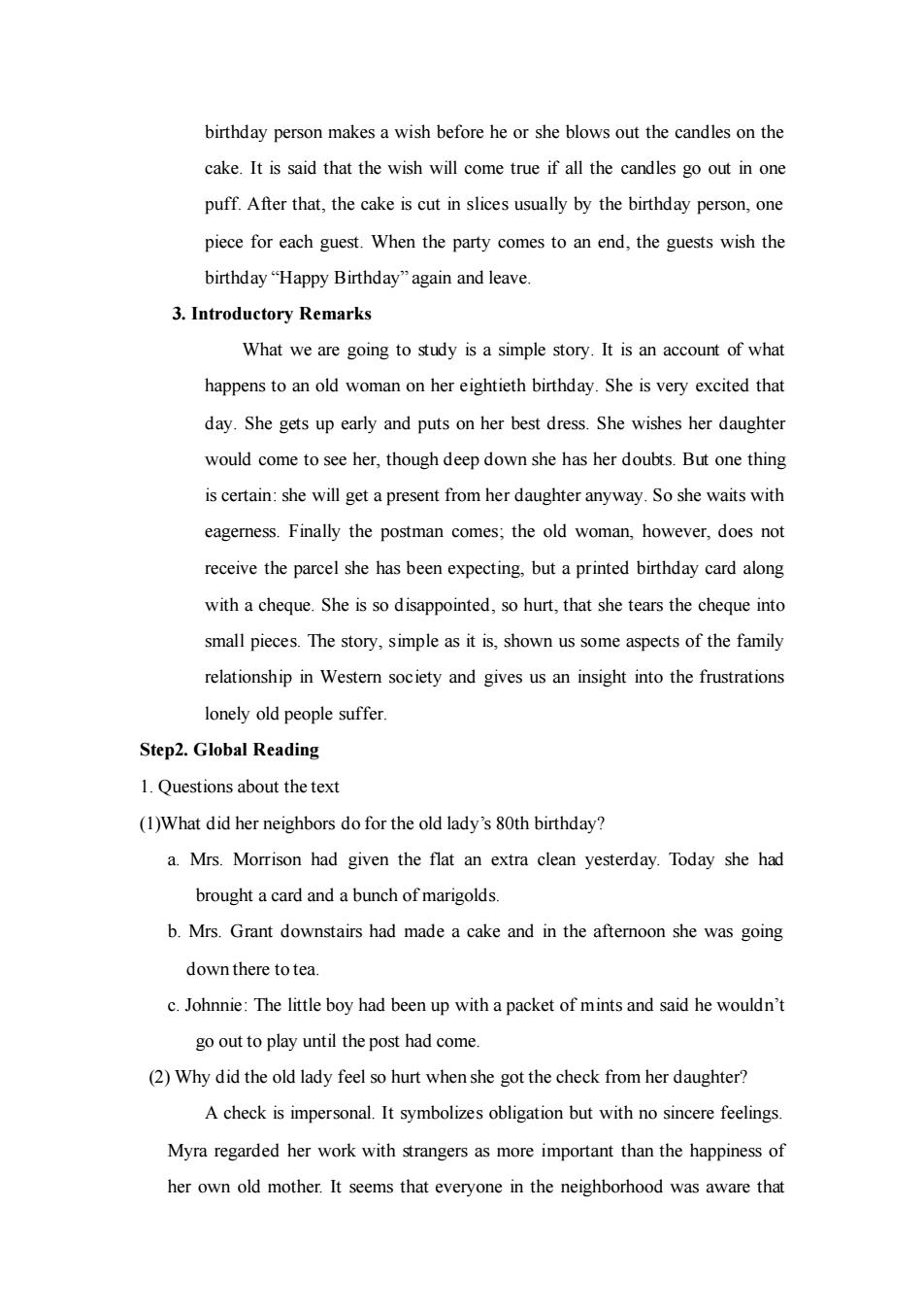
birthday person makes a wish before he or she blows out the candles on the cake.It is said that the wish will come true if all the candles go out in one puff.After that,the cake is cut in slices usually by the birthday person,one piece for each guest.When the party comes to an end,the guests wish the birthday“Happy Birthday”again and leave.. 3.Introductory Remarks What we are going to study is a simple story.It is an account of what happens to an old woman on her eightieth birthday.She is very excited that day.She gets up early and puts on her best dress.She wishes her daughter would come to see her,though deep down she has her doubts.But one thing is certain:she will get a present from her daughter anyway.So she waits with eagerness.Finally the postman comes;the old woman,however,does not receive the parcel she has been expecting,but a printed birthday card along with a cheque.She is so disappointed,so hurt,that she tears the cheque into small pieces.The story,simple as it is,shown us some aspects of the family relationship in Westem society and gives us an insight into the frustrations lonely old people suffer. Step2.Global Reading 1.Questions about the text (1)What did her neighbors do for the old lady's 80th birthday? a.Mrs.Morrison had given the flat an extra clean yesterday.Today she had brought a card and a bunch of marigolds b.Mrs.Grant downstairs had made a cake and in the aftemoon she was going down there to tea. c.Johnnie:The little boy had been up with a packet of mints and said he wouldn't go out to play until the post had come. (2)Why did the old lady feel so hurt when she got the check from her daughter? A check is impersonal.It symbolizes obligation but with no sincere feelings Myra regarded her work with strangers as more important than the happiness of her own old mother.It seems that everyone in the neighborhood was aware that
birthday person makes a wish before he or she blows out the candles on the cake. It is said that the wish will come true if all the candles go out in one puff. After that, the cake is cut in slices usually by the birthday person, one piece for each guest. When the party comes to an end, the guests wish the birthday “Happy Birthday” again and leave. 3. Introductory Remarks What we are going to study is a simple story. It is an account of what happens to an old woman on her eightieth birthday. She is very excited that day. She gets up early and puts on her best dress. She wishes her daughter would come to see her, though deep down she has her doubts. But one thing is certain: she will get a present from her daughter anyway. So she waits with eagerness. Finally the postman comes; the old woman, however, does not receive the parcel she has been expecting, but a printed birthday card along with a cheque. She is so disappointed, so hurt, that she tears the cheque into small pieces. The story, simple as it is, shown us some aspects of the family relationship in Western society and gives us an insight into the frustrations lonely old people suffer. Step2. Global Reading 1. Questions about the text (1)What did her neighbors do for the old lady’s 80th birthday? a. Mrs. Morrison had given the flat an extra clean yesterday. Today she had brought a card and a bunch of marigolds. b. Mrs. Grant downstairs had made a cake and in the afternoon she was going down there to tea. c. Johnnie: The little boy had been up with a packet of mints and said he wouldn’t go out to play until the post had come. (2) Why did the old lady feel so hurt when she got the check from her daughter? A check is impersonal. It symbolizes obligation but with no sincere feelings. Myra regarded her work with strangers as more important than the happiness of her own old mother. It seems that everyone in the neighborhood was aware that
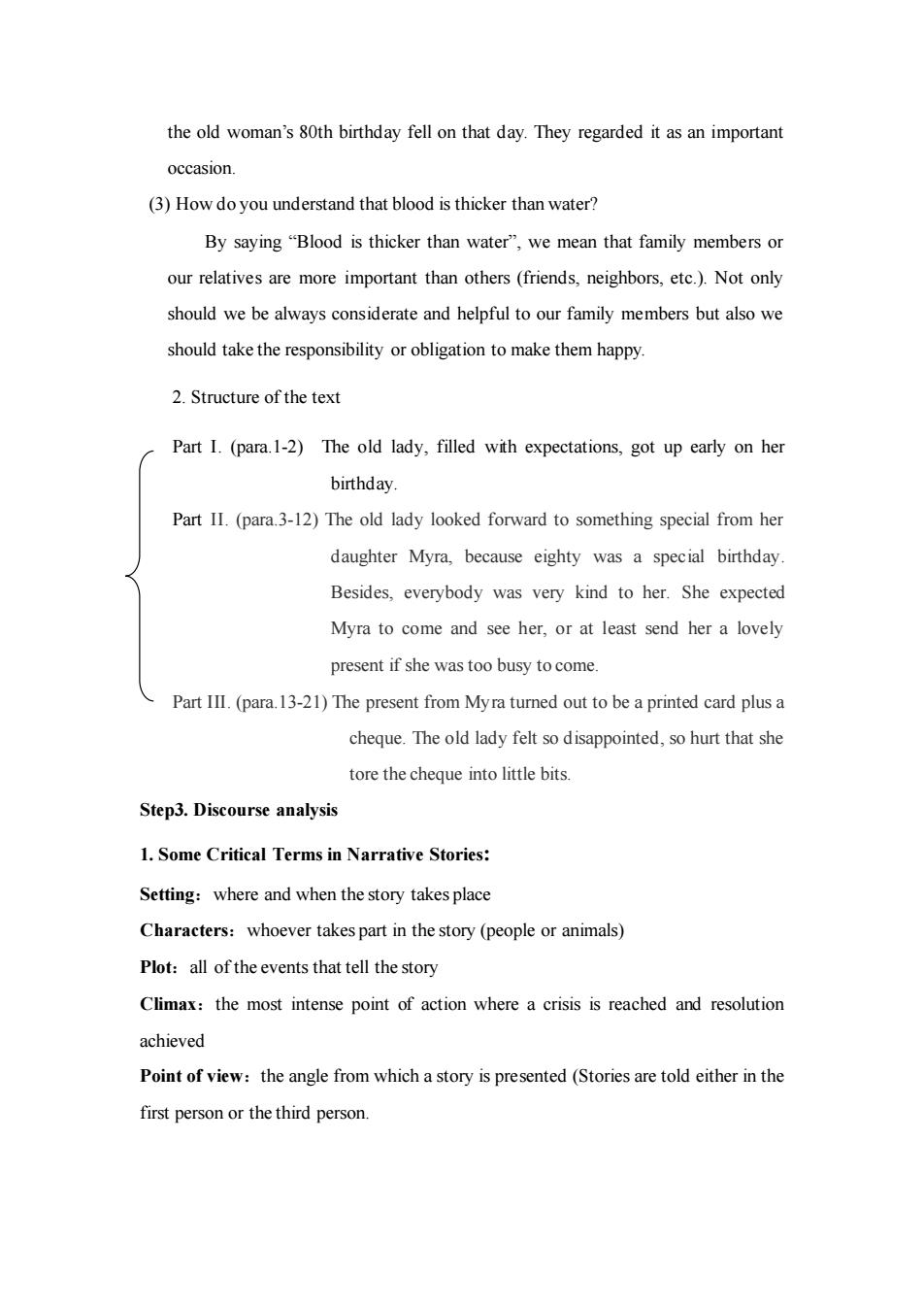
the old woman's 80th birthday fell on that day.They regarded it as an important occasion. (3)How do you understand that blood is thicker than water? By saying "Blood is thicker than water",we mean that family members or our relatives are more important than others (friends,neighbors,ete.).Not only should we be always considerate and helpful to our family members but also we should take the responsibility or obligation to make them happy. 2.Structure of the text Part I.(para.1-2)The old lady,filled with expectations,got up early on her birthday. Part II.(para.3-12)The old lady looked forward to something special from her daughter Myra,because eighty was a special birthday Besides,everybody was very kind to her.She expected Myra to come and see her,or at least send her a lovely present if she was too busy to come. Part III.(para.13-21)The present from Myra tured out to be a printed card plus a cheque.The old lady felt so disappointed,so hurt that she tore the cheque into little bits. Step3.Discourse analysis 1.Some Critical Terms in Narrative Stories: Setting:where and when the story takesplace Characters:whoever takes part in the story (people or animals) Plot:all of theevents that tell the story Climax:the most intense point of action where a crisis is reached and resolution achieved Point of view:the angle from which a story is presented(Stories are told either in the first person or the third person
the old woman’s 80th birthday fell on that day. They regarded it as an important occasion. (3) How do you understand that blood is thicker than water? By saying “Blood is thicker than water”, we mean that family members or our relatives are more important than others (friends, neighbors, etc.). Not only should we be always considerate and helpful to our family members but also we should take the responsibility or obligation to make them happy. 2. Structure of the text Part I. (para.1-2) The old lady, filled with expectations, got up early on her birthday. Part II. (para.3-12) The old lady looked forward to something special from her daughter Myra, because eighty was a special birthday. Besides, everybody was very kind to her. She expected Myra to come and see her, or at least send her a lovely present if she was too busy to come. Part III. (para.13-21) The present from Myra turned out to be a printed card plus a cheque. The old lady felt so disappointed, so hurt that she tore the cheque into little bits. Step3. Discourse analysis 1. Some Critical Terms in Narrative Stories: Setting:where and when the story takes place Characters:whoever takes part in the story (people or animals) Plot:all of the events that tell the story Climax:the most intense point of action where a crisis is reached and resolution achieved Point of view:the angle from which a story is presented (Stories are told either in the first person or the third person
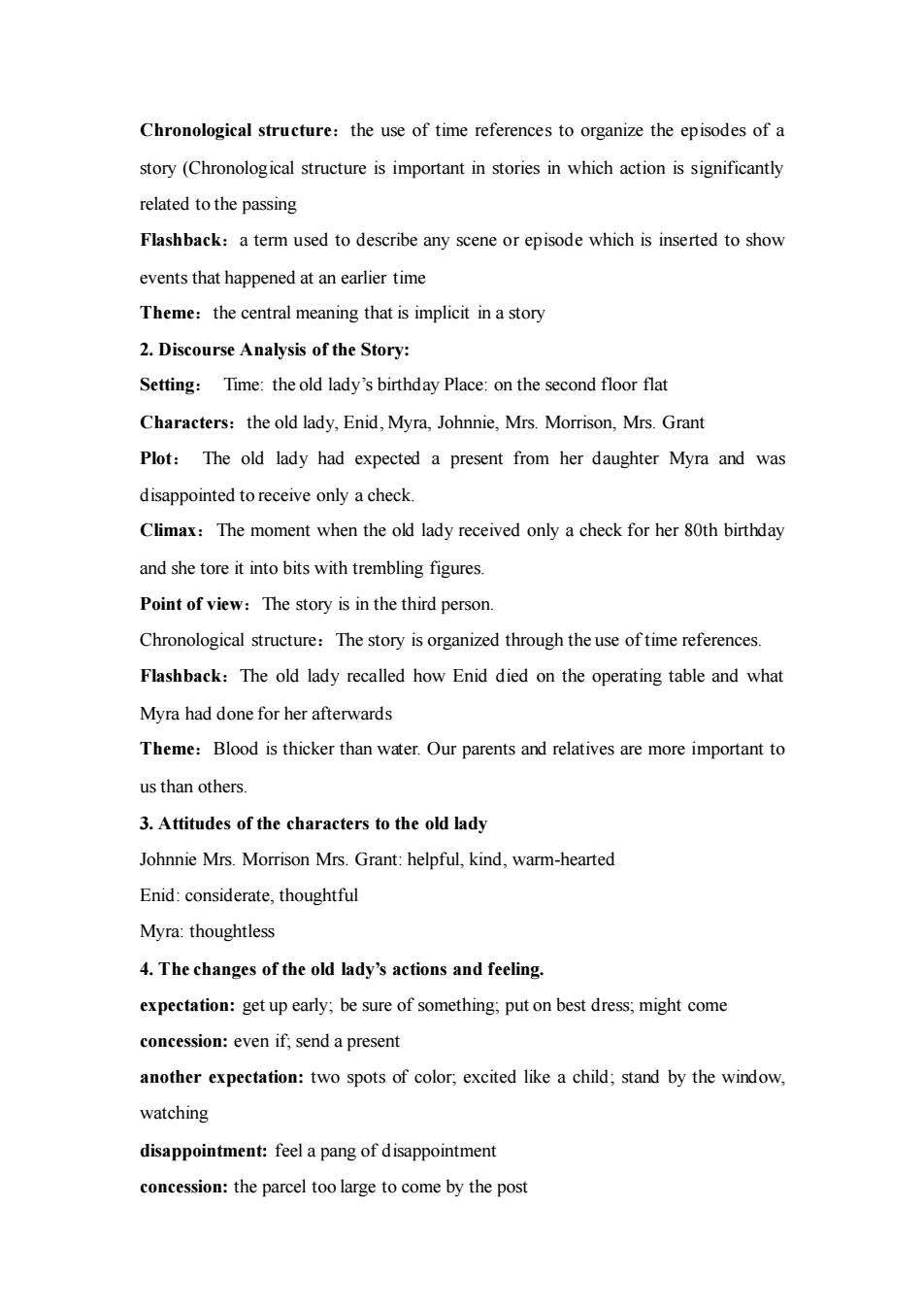
Chronological structure:the use of time references to organize the episodes of a story (Chronological structure is important in stories in which action is significantly related to the passing Flashback:a term used to describe any scene or episode which is inserted to show events that happened at an earlier time Theme:the central meaning that is implicit in a story 2.Discourse Analysis of the Story: Setting:Time:theold lady's birthday Place:on the second floor flat Characters:the old lady,Enid,Myra,Johnnie,Mrs.Morrison,Mrs.Grant Plot:The old lady had expected a present from her daughter Myra and was disappointed to receive only a check Climax:The moment when the old lady received only a check for her 80th birthday and she tore it into bits with trembling figures. Point of view:The story is in the third person Chronological structure:The story is organized through the use oftime references. Flashback:The old lady recalled how Enid died on the operating table and what Myra had done for her afterwards Theme:Blood is thicker than water.Our parents and relatives are more important to us than others. 3.Attitudes of the characters to the old lady Johnnie Mrs.Morrison Mrs.Grant:helpful,kind,warm-hearted Enid:considerate,thoughtful Myra:thoughtless 4.The changes of the old lady's actions and feeling. expectation:get up early;be sure of something,put on best dress,might come concession:even if;send a present another expectation:two spots of color,excited like a child;stand by the window. watching disappointment:feel a pang of disappointment concession:the parcel too large to come by the post
Chronological structure:the use of time references to organize the episodes of a story (Chronological structure is important in stories in which action is significantly related to the passing Flashback:a term used to describe any scene or episode which is inserted to show events that happened at an earlier time Theme:the central meaning that is implicit in a story 2. Discourse Analysis of the Story: Setting: Time: the old lady’s birthday Place: on the second floor flat Characters:the old lady, Enid, Myra, Johnnie, Mrs. Morrison, Mrs. Grant Plot: The old lady had expected a present from her daughter Myra and was disappointed to receive only a check. Climax:The moment when the old lady received only a check for her 80th birthday and she tore it into bits with trembling figures. Point of view:The story is in the third person. Chronological structure:The story is organized through the use of time references. Flashback:The old lady recalled how Enid died on the operating table and what Myra had done for her afterwards Theme:Blood is thicker than water. Our parents and relatives are more important to us than others. 3. Attitudes of the characters to the old lady Johnnie Mrs. Morrison Mrs. Grant: helpful, kind, warm-hearted Enid: considerate, thoughtful Myra: thoughtless 4. The changes of the old lady’s actions and feeling. expectation: get up early; be sure of something; put on best dress; might come concession: even if; send a present another expectation: two spots of color; excited like a child; stand by the window, watching disappointment: feel a pang of disappointment concession: the parcel too large to come by the post
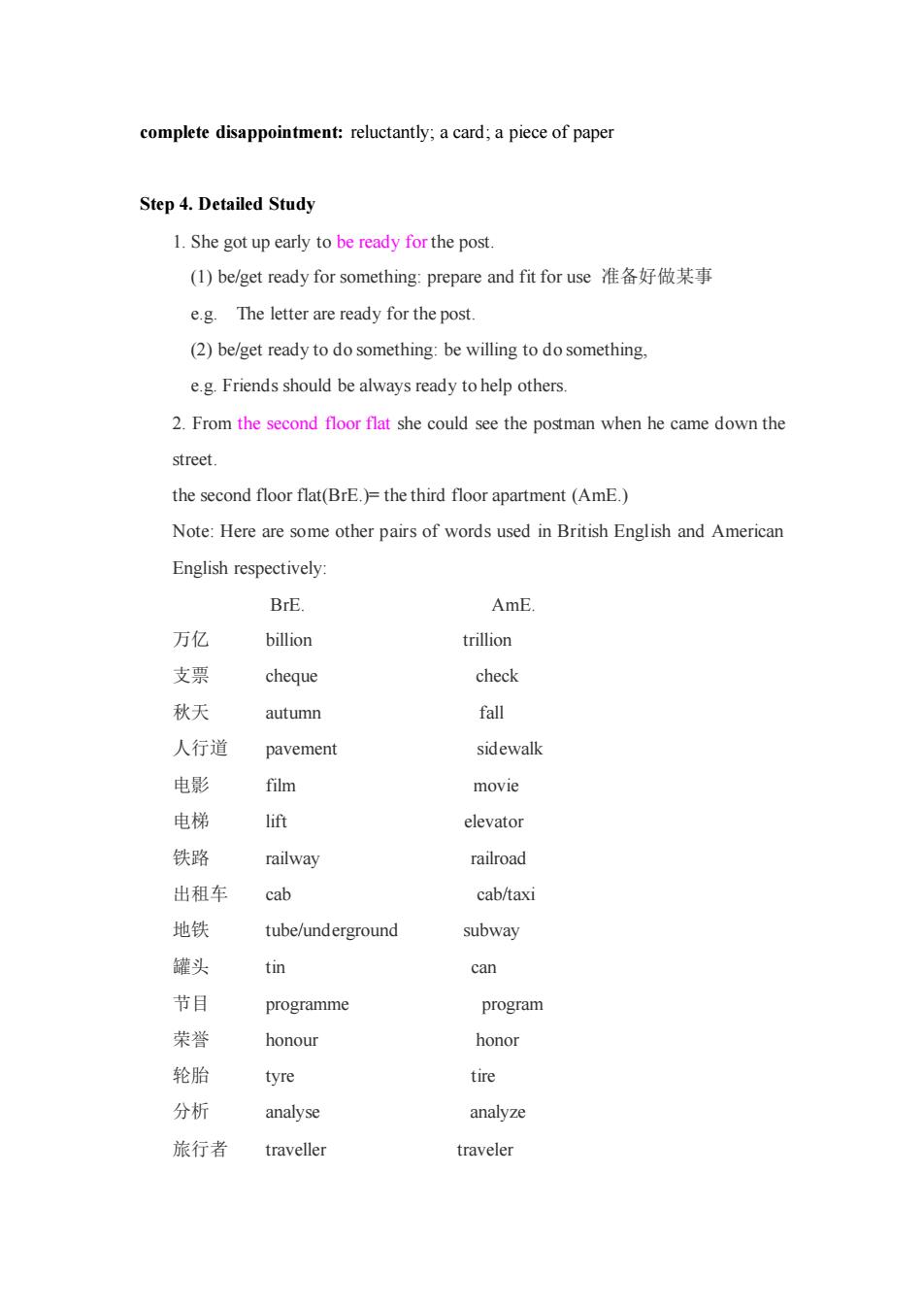
complete disappointment:reluctantly;a card:a piece of paper Step 4.Detailed Study 1.She got up early to be ready for the post. (I)be/get ready for something:prepare and fit for use准备好做某事 e.g.The letter are ready for the post. (2)be/get ready to do something:be willing to dosomething. e.g.Friends should be always ready to help others. 2.From the second floor flat she could see the postman when he came down the street the second floor flat(BrE.)=the third floor apartment(AmE.) Note:Here are some other pairs of words used in British English and American English respectively: BrE. AmE 万亿 billion trillion 支票 cheque check 秋天 autumn fall 人行道 pavement sidewalk 电影 film movie 电梯 i价 elevator 铁路 railway railroad 出租车 cab cab/taxi 地铁 tube/underground subway 罐头 场 节目 programme program 荣誉 honour honor 轮胎 tyre tire 分析 analyse analyze 旅行者 traveller traveler
complete disappointment: reluctantly; a card; a piece of paper Step 4. Detailed Study 1. She got up early to be ready for the post. (1) be/get ready for something: prepare and fit for use 准备好做某事 e.g. The letter are ready for the post. (2) be/get ready to do something: be willing to do something, e.g. Friends should be always ready to help others. 2. From the second floor flat she could see the postman when he came down the street. the second floor flat(BrE.)= the third floor apartment (AmE.) Note: Here are some other pairs of words used in British English and American English respectively: BrE. AmE. 万亿 billion trillion 支票 cheque check 秋天 autumn fall 人行道 pavement sidewalk 电影 film movie 电梯 lift elevator 铁路 railway railroad 出租车 cab cab/taxi 地铁 tube/underground subway 罐头 tin can 节目 programme program 荣誉 honour honor 轮胎 tyre tire 分析 analyse analyze 旅行者 traveller traveler
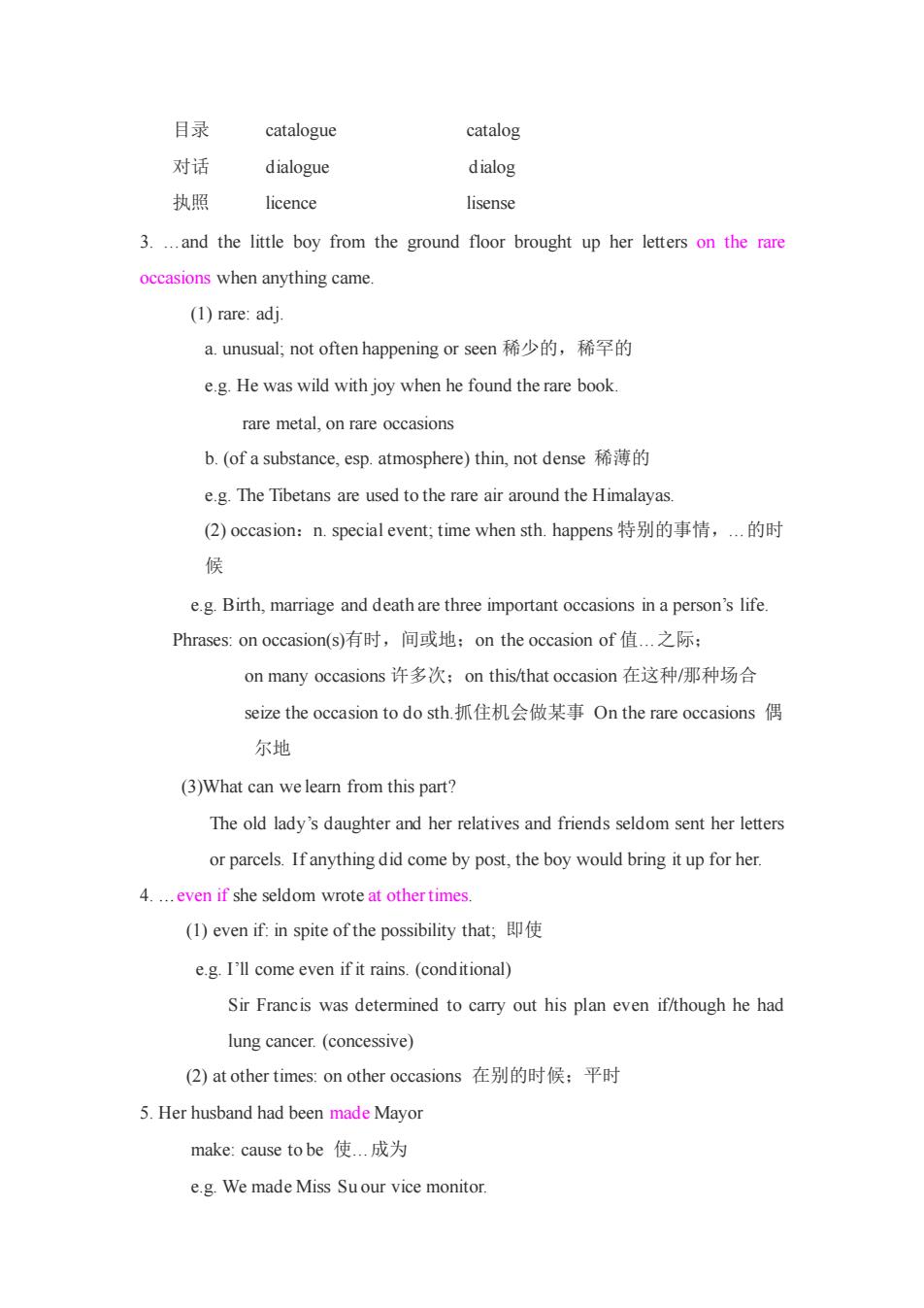
目录 catalogue catalog 对话 dialogue dialog 执照 licence lisense 3....and the little boy from the ground floor brought up her letters on the rare occasions when anything came. (1)rare:adj. a.unusual;not often happening or seen稀少的,稀罕的 e.g.He was wild with joy when he found the rare book rare metal,on rare occasions b.(of a substance,.csp.atmosphere)thin,not dense稀薄的 e.g.The Tibetans are used to the rare air around the Himalayas (2)occasion:n.special event;time when sth.happens特别的事情,的时 候 e.g.Birth,marriage and death are three important occasions in a person's life Phrases::on occasion(s)有时,间或地:on the occasion of值.之际: on many occasions许多次;on this/that occasion在这种/哪种场合 seize the occasion to do sth.抓住机会做某事On the rare occasions偶 尔地 (3)What can we learn from this part? The old lady's daughter and her relatives and friends seldom sent her letters or parcels.If anything did come by post,the boy would bring it up for her. 4....even if she seldom wrote at other times. (I)even if,in spite of the possibility that,即使 e.g.I'll come even if it rains.(conditional) Sir Francis was determined to carry out his plan even if/though he had lung cancer.(concessive) (2)at other times:on other occasions在别的时候:平时 5.Her husband had been made Mayor make:cause to be使.成为 e.g.We made Miss Suour vice monitor
目录 catalogue catalog 对话 dialogue dialog 执照 licence lisense 3. …and the little boy from the ground floor brought up her letters on the rare occasions when anything came. (1) rare: adj. a. unusual; not often happening or seen 稀少的,稀罕的 e.g. He was wild with joy when he found the rare book. rare metal, on rare occasions b. (of a substance, esp. atmosphere) thin, not dense 稀薄的 e.g. The Tibetans are used to the rare air around the Himalayas. (2) occasion:n. special event; time when sth. happens 特别的事情,…的时 候 e.g. Birth, marriage and death are three important occasions in a person’s life. Phrases: on occasion(s)有时,间或地;on the occasion of 值…之际; on many occasions 许多次;on this/that occasion 在这种/那种场合 seize the occasion to do sth.抓住机会做某事 On the rare occasions 偶 尔地 (3)What can we learn from this part? The old lady’s daughter and her relatives and friends seldom sent her letters or parcels. If anything did come by post, the boy would bring it up for her. 4. …even if she seldom wrote at other times. (1) even if: in spite of the possibility that; 即使 e.g. I’ll come even if it rains. (conditional) Sir Francis was determined to carry out his plan even if/though he had lung cancer. (concessive) (2) at other times: on other occasions 在别的时候;平时 5. Her husband had been made Mayor make: cause to be 使…成为 e.g. We made Miss Su our vice monitor
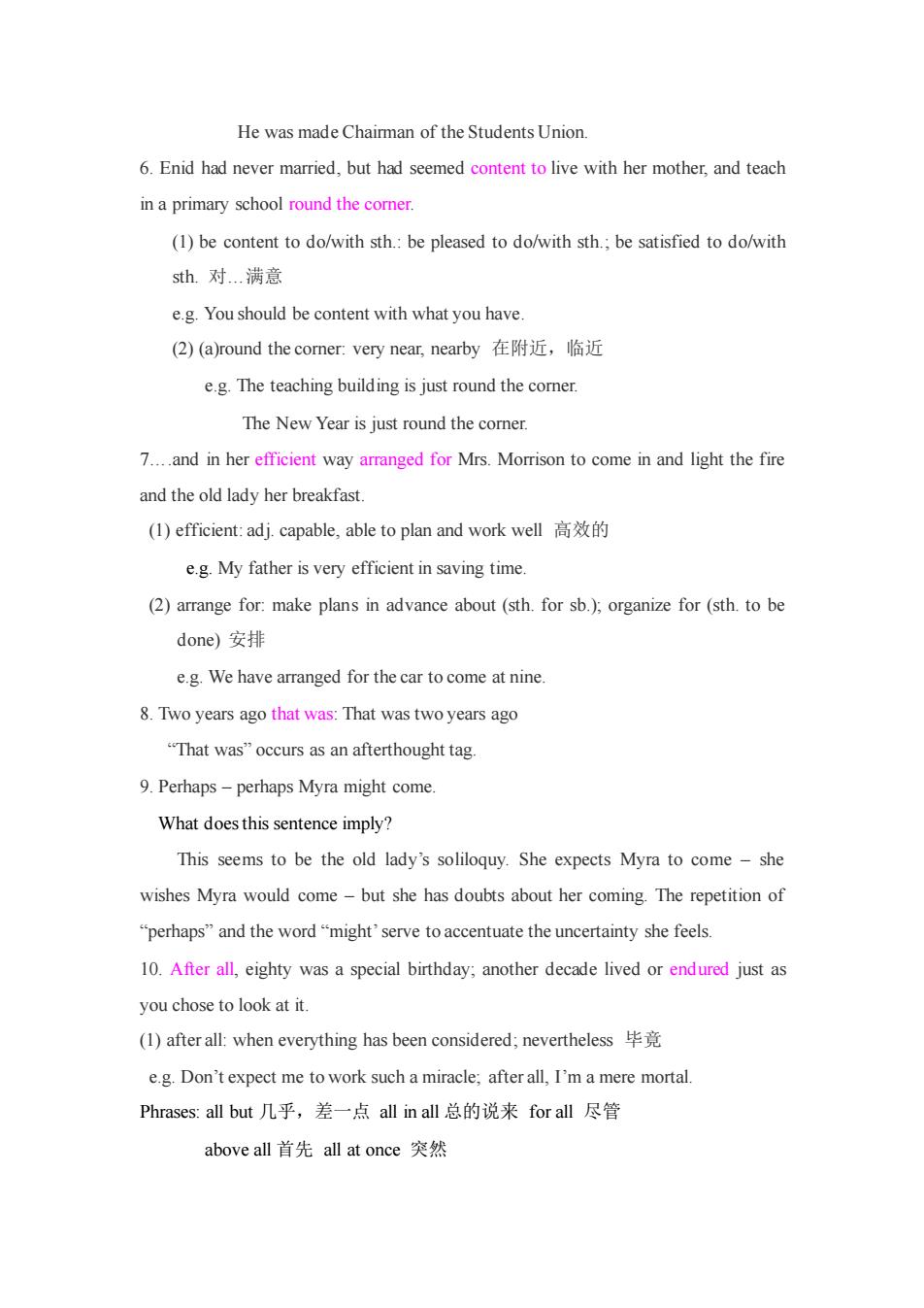
He was made Chairman of the Students Union. 6.Enid had never married,but had seemed content to live with her mother,and teach in a primary school round the comer (1)be content to do/with sth.:be pleased to do/with sth.;be satisfied to do/with sh.对满意 e.g.You should be content with what you have. (2)(a)round the comer:very near,nearby在附近,临近 e.g.The teaching building is just round the comer. The New Year is just round the comer. 7..and in her efficient way arranged for Mrs.Morrison to come in and light the fire and the old lady her breakfast. (l)efficient:adj.capable,able to plan and work well高效的 e.g.My father is very efficient in saving time (2)arrange for:make plans in advance about(sth.for sb.).organize for (sth.to be done)安排 e.g.We have arranged for the car to come at nine. 8.Two years ago that was:That was two years ago “That was'”occurs as an afterthought tag. 9.Perhaps-perhaps Myra might come. What does this sentence imply? This seems to be the old lady's soliloquy.She expects Myra to come-she wishes Myra would come-but she has doubts about her coming.The repetition of "perhaps"and the word"might'serve to accentuate the uncertainty she feels. 10.After all,eighty was a special birthday:another decade lived or endured just as you chose to look at it (1)after all:when everything has been considered;nevertheless e.g.Don't expect me to work such a miracle;after all,I'm a mere mortal. Phrases:all but几乎,差一点all in all总的说来for all尽管 above all首先all at once突然
He was made Chairman of the Students Union. 6. Enid had never married, but had seemed content to live with her mother, and teach in a primary school round the corner. (1) be content to do/with sth.: be pleased to do/with sth.; be satisfied to do/with sth. 对…满意 e.g. You should be content with what you have. (2) (a)round the corner: very near, nearby 在附近,临近 e.g. The teaching building is just round the corner. The New Year is just round the corner. 7….and in her efficient way arranged for Mrs. Morrison to come in and light the fire and the old lady her breakfast. (1) efficient: adj. capable, able to plan and work well 高效的 e.g. My father is very efficient in saving time. (2) arrange for: make plans in advance about (sth. for sb.); organize for (sth. to be done) 安排 e.g. We have arranged for the car to come at nine. 8. Two years ago that was: That was two years ago “That was” occurs as an afterthought tag. 9. Perhaps – perhaps Myra might come. What does this sentence imply? This seems to be the old lady’s soliloquy. She expects Myra to come – she wishes Myra would come – but she has doubts about her coming. The repetition of “perhaps” and the word “might’ serve to accentuate the uncertainty she feels. 10. After all, eighty was a special birthday; another decade lived or endured just as you chose to look at it. (1) after all: when everything has been considered; nevertheless 毕竟 e.g. Don’t expect me to work such a miracle; after all, I’m a mere mortal. Phrases: all but 几乎,差一点 all in all 总的说来 for all 尽管 above all 首先 all at once 突然
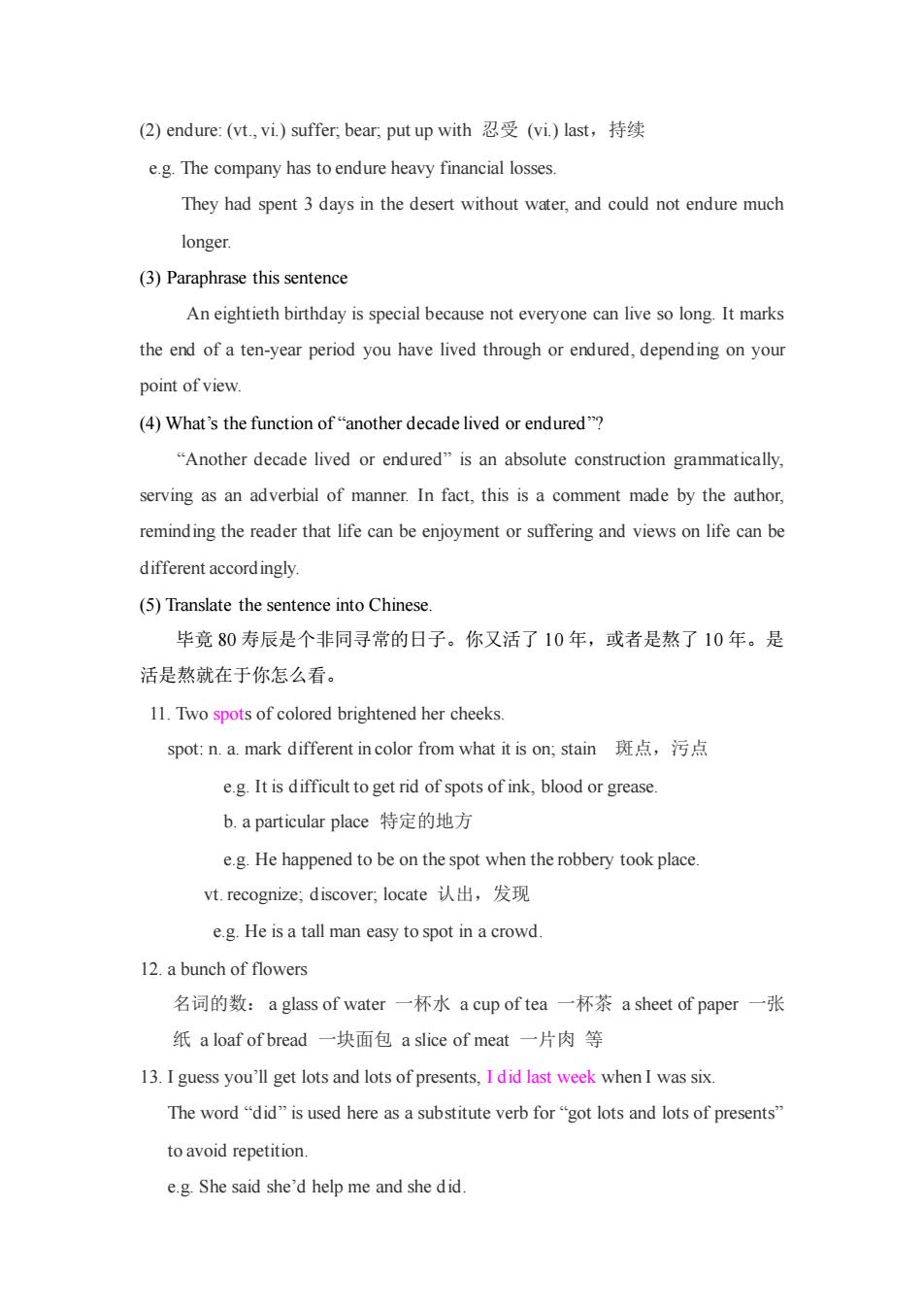
(2)endure:(t,Vvi)suffer,.bear,put up with忍受(wi)last,持续 e.g.The company has to endure heavy financial losses. They had spent 3 days in the desert without water,and could not endure much longer. (3)Paraphrase this sentence An eightieth birthday is special because not everyone can live so long.It marks the end of a ten-year period you have lived through or endured,depending on you point of view (4)What's the function of"another decade lived or endured"? "Another decade lived or endured"is an absolute construction grammatically, serving as an adverbial of manner.In fact,this is a comment made by the author. reminding the reader that life can be enjoyment or suffering and views on life can be different accordingly (5)Translate the sentence into Chinese 毕竟80寿辰是个非同寻常的日子。你又活了10年,或者是熬了10年。是 活是热就在于你怎么看。 11.Two spots of colored brightened her cheeks. spot:n.a.mark different incoor from what it is on stain斑点,污点 e.g.It is difficult to get rid of spots of ink.blood or grease. b.a particular place特定的地方 e.g.He happened to be on the spot when the robbery took place vt.recognize,discover,locate认出,发现 e.g.He is a tall man easy to spot in a crowd 12.a bunch of flowers 名词的数:aglass of water一杯水a cup of tea一杯茶a sheet of paper一张 纸a loaf of bread一块面包a slice of meat一片肉等 13.I guess you'll get lots and lots of presents,I did last week when I was six. The word"did"is used here as a substitute verb for"got lots and lots of presents" toavoid repetition e.g.She said she'd help me and she did
(2) endure: (vt., vi.) suffer; bear; put up with 忍受 (vi.) last,持续 e.g. The company has to endure heavy financial losses. They had spent 3 days in the desert without water, and could not endure much longer. (3) Paraphrase this sentence An eightieth birthday is special because not everyone can live so long. It marks the end of a ten-year period you have lived through or endured, depending on your point of view. (4) What’s the function of “another decade lived or endured”? “Another decade lived or endured” is an absolute construction grammatically, serving as an adverbial of manner. In fact, this is a comment made by the author, reminding the reader that life can be enjoyment or suffering and views on life can be different accordingly. (5) Translate the sentence into Chinese. 毕竟 80 寿辰是个非同寻常的日子。你又活了 10 年,或者是熬了 10 年。是 活是熬就在于你怎么看。 11. Two spots of colored brightened her cheeks. spot: n. a. mark different in color from what it is on; stain 斑点,污点 e.g. It is difficult to get rid of spots of ink, blood or grease. b. a particular place 特定的地方 e.g. He happened to be on the spot when the robbery took place. vt. recognize; discover; locate 认出,发现 e.g. He is a tall man easy to spot in a crowd. 12. a bunch of flowers 名词的数: a glass of water 一杯水 a cup of tea 一杯茶 a sheet of paper 一张 纸 a loaf of bread 一块面包 a slice of meat 一片肉 等 13. I guess you’ll get lots and lots of presents, I did last week when I was six. The word “did” is used here as a substitute verb for “got lots and lots of presents” to avoid repetition. e.g. She said she’d help me and she did

14.Then clatter,clatter up the stairs. (1)Meaning:Then came the clattering sound of the boy's feet (or:Then came the quick noisy footsteps)up the stairs (2)What does this sentence suggest? This suggests that the old lady was listening for the boy's footsteps in her room,eagerly and attentively. 15.The old lady felt a pang of disappointment. (1)pang:n.a sudden sharp mental or emotional pain e.g.a pang of sadness,a pang ofremorse (2)disappointfail to fulfill the hope of(a person)使.失望 e.g.Work hard.Don'tdisappoint your parents. Phrases::to one's disappointment令某人失望的是 be disappointed about/at/withsth.对某事失望 be disappointed in/with sb.对某人失望 (3)What does this sentence imply? Immediately she felt very disappointed and her heart began to ache sharply. 16.That was it What does this sentence mean? That was the reason why the parcel had not come yet."That was it"(if we use present tense it's always"that's it)is an idiomatic expression which often means That explained /explains what had/has happened" 17.reluctantly:ad.unwillingly不情愿地 e.g.The child tumed offthe TV reluctantly. 18.Her present,her lovely present What does this incomplete sentence indicate? This sentence is equal to an imperative structure.It has a special rhetorical function,showing the old lady's excitement,anger and desperation. 19.pick up
14. Then clatter, clatter up the stairs. (1) Meaning: Then came the clattering sound of the boy’s feet (or: Then came the quick noisy footsteps) up the stairs. (2) What does this sentence suggest? This suggests that the old lady was listening for the boy’s footsteps in her room, eagerly and attentively. 15. The old lady felt a pang of disappointment. (1) pang: n. a sudden sharp mental or emotional pain 剧痛 e.g. a pang of sadness, a pang of remorse (2) disappoint v. fail to fulfill the hope of (a person) 使…失望 e.g. Work hard. Don’t disappoint your parents. Phrases: to one’s disappointment 令某人失望的是 be disappointed about/at/with sth. 对某事失望 be disappointed in/with sb. 对某人失望 (3)What does this sentence imply? Immediately she felt very disappointed and her heart began to ache sharply. 16. That was it. What does this sentence mean? That was the reason why the parcel had not come yet. “That was it” (if we use present tense it’s always “that’s it) is an idiomatic expression which often means “That explained / explains what had / has happened”. 17. reluctantly: ad. unwillingly 不情愿地 e.g. The child turned off the TV reluctantly. 18. Her present, her lovely present. What does this incomplete sentence indicate? This sentence is equal to an imperative structure. It has a special rhetorical function, showing the old lady’s excitement, anger and desperation. 19. pick up